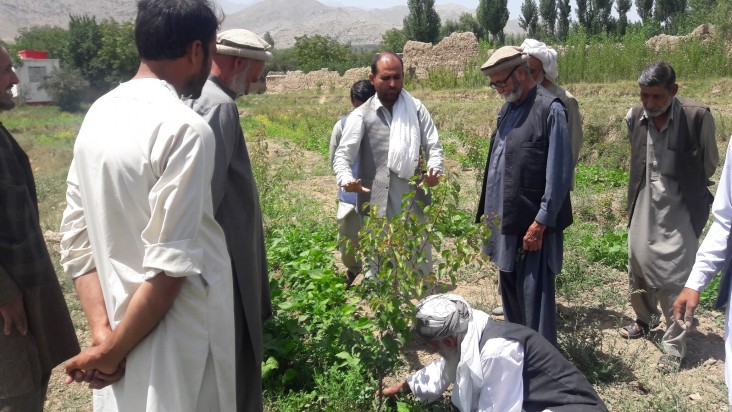Speeches Shim

While Afghanistan is known for its delicious apricots, Afghan apricot varieties and production techniques typically result in low yields and farm incomes. One problem is that the type of apricots usually grown in Afghanistan is ill-suited to cold spring temperatures. In fact, some farmers in eastern Afghanistan abandoned apricots for other kinds of fruit trees.
The owners of Roots Agriculture and Livestock Services (RALS), a Kabul-based agricultural supplier, saw this problem as an opportunity. RALS began to import and cultivate improved varieties of apricot saplings that produce higher yields, are more disease resistant, and can sustain the cold weather. The trees are smaller than traditional Afghan apricot varieties and therefore, more trees can be planted on farmers’ land.
The challenge for RALS was how to convince farmers to switch to the new variety. The company realized it needed assistance, so in 2018, it applied for a small matching grant from the USAID Regional Agricultural Development Program-East (RADP-East).
The company used the grant to produce promotional material, establish five demonstration plots in Kabul, Parwan, Logar, Wardak, and Ghazni provinces; provide some pruning and other equipment to farmers, and most importantly, train farmers in how to plant and cultivate the saplings.
As a result of USAID’s assistance, the company initially sold 7,000 saplings. At maturity, these apricot trees are expected to yield 350 percent more fruit than traditional varieties. The company also expects to double its sales in 2020 and hire six addi-tional employees.
“I used to own two jeribs (0.4 hector) of apricot orchard. As our area is a bit cold during spring season, local apricot varieties lose their flowers, which resulted in low yields. When I participated in RALS sponsored high-density apricot promotional field day and saw the result, it encouraged me to establish one jerib apricot high-density orchard on my land,” said farmer Mirza Mohammad.
RADP-East is a $28 million, five-year USAID-funded project start-ed in July 2016 to strengthen linkages among farmers, suppli-ers, and other actors in the agricultural sector in central and eastern Afghanistan.

Comment
Make a general inquiry or suggest an improvement.